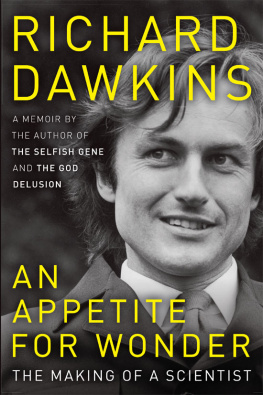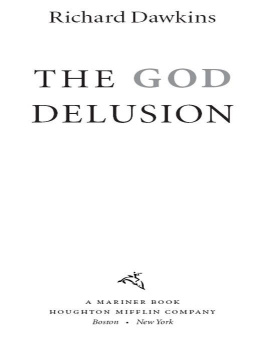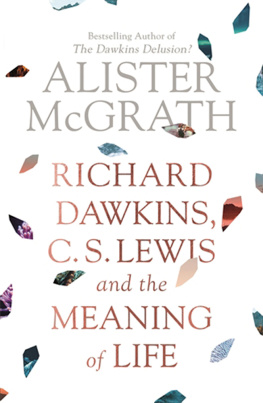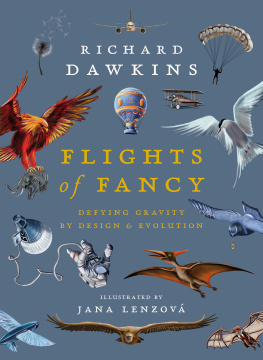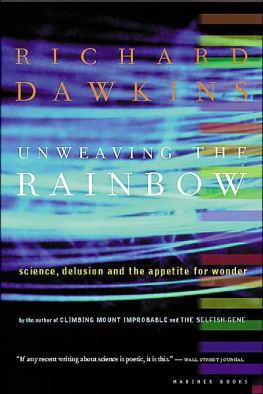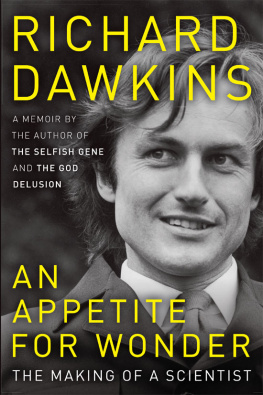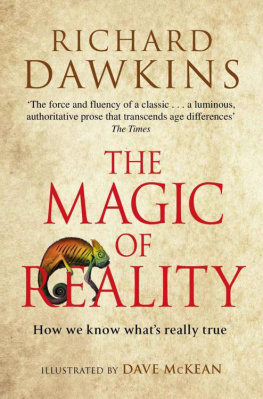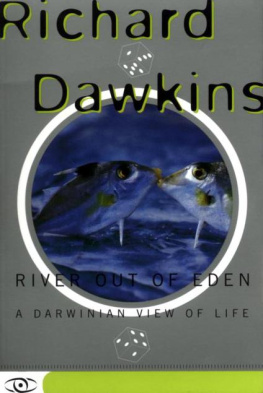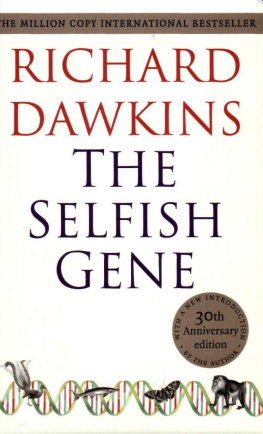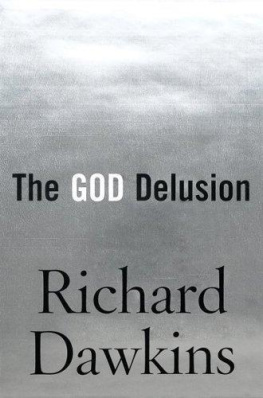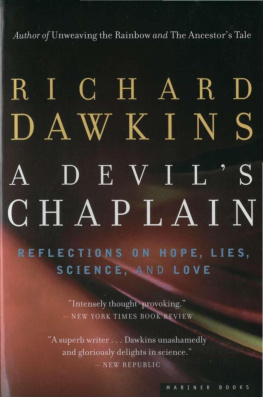To my mother and my sister, who shared the years with me, and in memory of my father, missed by all.
CONTENTS
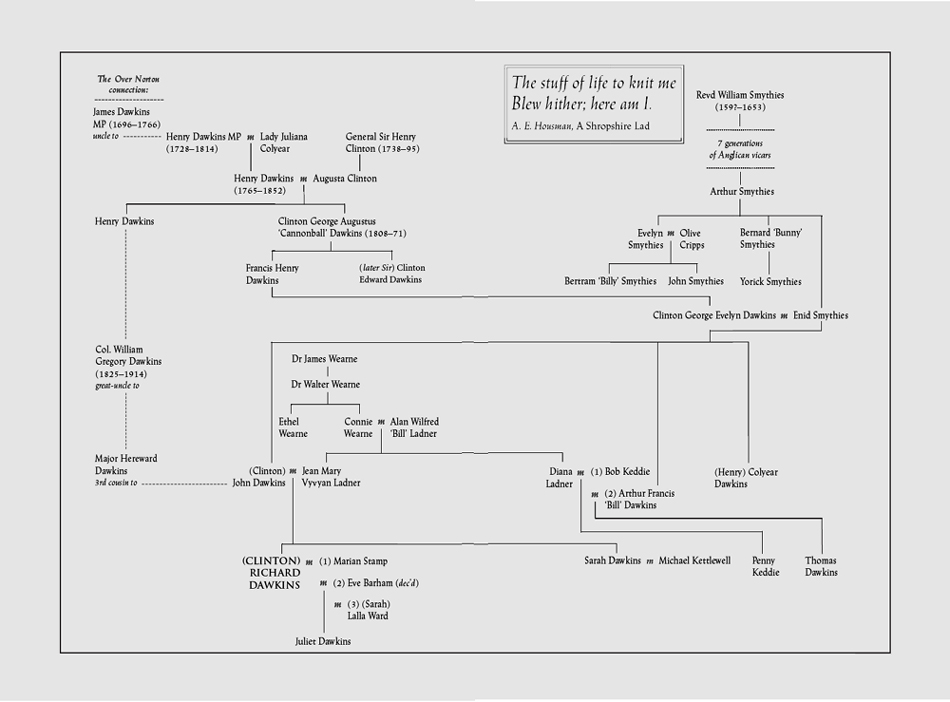
G LAD to know you, Clint. The friendly passport controller was not to know that British people are sometimes given a family name first, followed by the name their parents wanted them to use. I was always to be Richard, just as my father was always John. Our first name of Clinton was something we forgot about, as our parents had intended. To me, it has been no more than a niggling irritation which I would have been happier without (notwithstanding the serendipitous realization that it gives me the same initials as Charles Robert Darwin). But alas, nobody anticipated the United States Department of Homeland Security. Not content with scanning our shoes and rationing our toothpaste, they decreed that anyone entering America must travel under his first name, exactly as written in his passport. So I had to forgo my lifelong identity as Richard and rebrand myself Clinton R. Dawkins when booking tickets to the States and, of course, when filling in those important forms: the ones that require you explicitly to deny that you are entering the USA in order to overthrow the constitution by force of arms. (Sole purpose of visit was the British broadcaster Gilbert Hardings response to that; nowadays such levity will see you banged up.)
Clinton Richard Dawkins, then, is the name on my birth certificate and passport, and my father was Clinton John. As it happened, he was not the only C. Dawkins whose name appeared in The Times as the father of a boy born in the Eskotene Nursing Home, Nairobi, in March 1941. The other was the Reverend Cuthbert Dawkins, Anglican missionary and no relation. My bemused mother received a shower of congratulations from bishops and clerics in England, unknown to her but kindly calling down Gods blessings upon her newborn son. We cannot know whether the misdirected benedictions intended for Cuthberts son had any improving effect on me, but he became a missionary like his father and I became a biologist like mine. To this day my mother jokes that I might be the wrong one. I am happy to say that more than just my physical resemblance to my father reassures me that I am not a changeling, and was never destined for the church.
Clinton first became a Dawkins family name when my great-great-great-grandfather Henry Dawkins (17651852) married Augusta, daughter of General Sir Henry Clinton (173895), who, as Commander-in-Chief of British forces from 1778 to 1782, was partly responsible for losing the American War of Independence. The circumstances of the marriage make the commandeering of his name by the Dawkins family seem a bit cheeky. The following extract is from a history of Great Portland Street, where General Clinton lived.
In 1788 his daughter eloped from this street in a hackney-coach with Mr Dawkins, who eluded pursuit by posting half a dozen other hackney-coaches at the corners of the street leading into Portland Place, with directions to drive off as rapidly as possible, each in a different direction...
I wish I could claim this ornament of the family escutcheon as the inspiration for Stephen Leacocks Lord Ronald, who... flung himself upon his horse and rode madly off in all directions. Id also like to think that I inherited some of Henry Dawkinss resourcefulness, not to mention his ardour. This is unlikely, however, as only one 32nd part of my genome is derived from him. One 64th part is from General Clinton himself, and I have never shown any military leanings. Tess of the DUrbervilles and The Hound of the Baskervilles are not the only works of fiction that invoke hereditary throwbacks to distant ancestors, forgetting that the proportion of genes shared is halved with every generation and therefore dies away exponentially or it would if it were not for cousin-marriage, which becomes ever more frequent the more distant the cousinship, so that we are all more or less distant cousins of each other.
It is a remarkable fact, which you can prove to yourself without leaving your armchair, that if you go back far enough in a time machine, any individual you meet who has any living human descendants at all must be an ancestor of everybody living. When your time machine has travelled sufficiently far into the past, everybody you meet is an ancestor either of everybody alive in 2013 or of nobody. By the method of reductio ad absurdum beloved of mathematicians, you can see that this has to be true of our fishy ancestors of the Devonian era (my fish has to be the same as your fish, because the absurd alternative is that your fishs descendants and my fishs descendants stayed chastely separate from each other for 300 million years yet are still capable of interbreeding today). The only question is how far back you have to go to apply that argument. Clearly not as far as our fishy forebears, but how far? Well, hurdling swiftly over the detailed calculation, I can tell you that if the Queen is descended from William the Conqueror, you quite probably are too (and give or take the odd illegitimacy I know I am, as does almost everybody with a recorded pedigree).
Henry and Augustas son, Clinton George Augustus Dawkins (180871) was one of the few Dawkinses actually to use the name Clinton. If he inherited any of his fathers ardour he nearly lost it in 1849 during an Austrian bombardment of Venice, where he was the British consul. I have a cannonball in my possession, sitting on a plinth bearing an inscription on a brass plate. I dont know whose is the authorial voice and I dont know how reliable it is, but, for what it is worth, here is my translation (from French, then the language of diplomacy):
One night when he was in bed, a cannonball penetrated the bed covers and passed between his legs, but happily did him no more than superficial damage. I first took this to be a tall story, until I learned for certain that it was based on the exact truth. His Swiss colleague met him later in the funeral procession of the American consul and, when asked about it, he laughingly confirmed the facts and told him it was precisely for this reason he was limping.
This narrow escape of my ancestors vital parts took place before he was to put them to use, and it is tempting to attribute my own existence to a stroke of ballistic luck. A few inches closer to the fork of Shakespeares radish and... But actually my existence, and yours, and the postmans, hangs from a far narrower thread of luck than that. We owe it to the precise timing and placing of everything that ever happened since the universe began. The incident of the cannonball is only a dramatic example of a much more general phenomenon. As I have put it before, if the second dinosaur to the left of the tall cycad tree had not happened to sneeze and thereby fail to catch the tiny, shrew-like ancestor of all the mammals, we would none of us be here. We all can regard ourselves as exquisitely improbable. But here, in a triumph of hindsight, we are.
C. G. A. (Cannonball) Dawkinss son Clinton (later Sir Clinton) Edward Dawkins (18591905) was one of many Dawkinses to attend Balliol College, Oxford. He was there at the right time to be immortalized in the Balliol Rhymes, originally published as a broadsheet called The Masque of Balliol in 1881. In the spring term of that year, seven undergraduates composed and printed scurrilous rhymes about personalities of the college. Most famous is the verse that celebrates Balliols great Master, Benjamin Jowett, composed by H. C. Beeching, later Dean of Norwich Cathedral:

